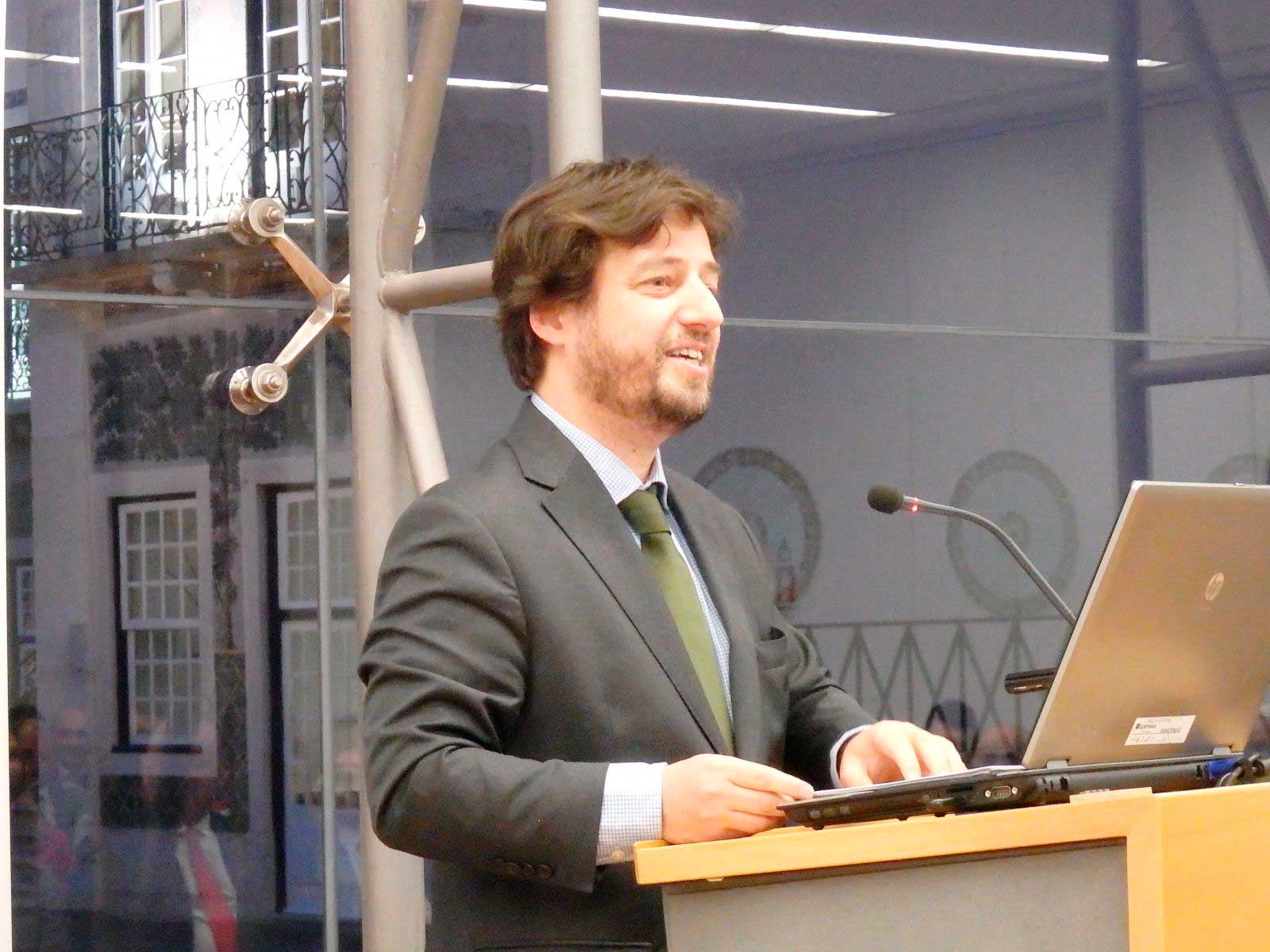Portugal launches Social Innovation Initiative, a “strategy for the civic economy”
Dr. Miguel Poiares Maduro, Minister in the Cabinet of the Prime Minister and for Regional Development launched the Social Innovation Initiative, a “strategy for the civic economy”
Presentation speech:
“The world has changed. Challenges are growing and becoming more and more complex. We are living in the aftermath of what is the most severe world crisis after the Big Depression of 1929/30. The sovereign debt crisis added to the 2007/2008 financial crisis.
In Europe, the economic and financial problems hit on the resurgence of populist movements, ageing population, youth unemployment, new phenomena of impoverishment and exclusion. We experience very significant pressures on the European Social Model, which was created in the post WWII era in a completely different context and situation. These European challenges are mostly shared by Portugal, at a time in which Portugal is about to leave the critical path of the most complex sovereign debt crises in its history, the most serious crisis in its democratic history.
Models and current responses are mostly in crisis. The world is in transition. To what exactly? That is not clear yet. But whatever the final result of this transition may be, we know that it will depend on the new models and new answers that we will be able to come up with.
Therefore, we need new models and new answers. Models and answers that are innovative, simple, scalable and replicable. Participative and co-created; capable of producing real impact, measurable. These are exactly the characteristics that are at the root of Social Innovation initiatives: Innovation, Simplicity, Scalability, Proximity and Impact. And, using the title of this public session, these are also the principles that should underpin the construction of a true civic economy.
This is a new (or maybe not so new) area of intervention that certainly aims to stimulate innovation in the social sector. But I do not understand Social Innovation as something uniquely associated with the social domain in a stricter sense. That would be a tremendously reductionistic vision, given the transformation potential of Social Innovation.
In the current context, it is urgent to introduce those principles of innovation in public policies, encouraging the emergence of more innovative solutions that give new answers to urging problems, not only in the social sphere, but also in education, health, justice, environment, etc., which implies a logic of intervention that is more comprehensive and transversal, breaking with traditional labels and existing bias.
This is the right moment in Portugal to create the conditions that will support the development, the expansion and the consolidation of this kind of innovation initiatives and social entrepreneurship in a broader sense. And in parallel, the creation and promotion of a real social investment ecosystem, involving and empowering the traditional actors (Portugal has a long and very positive tradition in the social innovation area)…
But also the new actors, such as the Laboratory of Social Innovation, the BIS, and many other new initiatives emerging at this time in Portugal. My expectation is to come to count on a growing number of future actors in this area, even if today still non-existent . And that is precisely the goal of the Portugal Social Innovation initiative, currently being launched by the Portuguese government: create a true social investment market in Portugal.
Firstly, I believe it is urgent to create incentives for the market to value the social impact of economic activity, and not only the purely commercial. How? By clearly assuming that the wider social benefits have or must have a corresponding market value. More and more, consumers base their choices on the brands’ social and environmental sustainability. However, the behaviour of investors and funders does not yet reflect this.
That is what we seek to achieve by creating incentives for behaviour change. Secondly, we intend to promote the emergence of innovative public policies, in particular those involving the civil society in the design and experimenting of such policies.
It was therefore with great interest that I accepted the invitation to share with you first hand the broad outlines of Portugal Social Innovation, in what will be the first disclosure to a broader public of this initiative, after an initial more restricted presentation and debate on the occasion of the last meeting of the National Council for the Social Economy, where it was very well received by representatives of social sector organizations.
So let me share with you some of the details of the initiative of the Portuguese Government. Following international models and best practices (e.g., the Big Society Capital of the UK), the Portugal Social Innovation will be the financial base to sustain development of a new national social investment market to support innovation initiatives and social entrepreneurship in an integrated format.
Thus, it is a financing instrument; however, a very special one.
Firstly, due to the source of its initial amount of 150 million Euro: the European Structural Funds and its various operational programmes. Currently I am closing this negotiation with the European Commission, and I am experiencing an extremely positive response by the Commission services, that consider Portugal Social Innovation a pioneer initiative at European level, with strong potential for replication in other Member States.
Secondly, due to the logic of complementarity it assumes: Portugal Social Innovation does not mean to replace or override the current instruments available or others to come (for instance those funded by Portugal 2020). It is rather an additional financing source for the various existing and emerging initiatives of social innovation and entrepreneurship.
There is no direct intervention in the market, it behaves rather like a whole seller, neutral and equidistant from the various ecosystem actors.
These actors will be the beneficiaries of the funds channelled by Portugal Social Innovation, either in their role as intermediaries to make these funds reach the smaller organizations and social entrepreneurs, or as the final beneficiaries, embedded in the communities they intend to serve, who directly develop projects targeting these audiences in the social, health, education, justice, etc. areas.
Thirdly, due to the link between the dimensions funding and enabling.
This is a new area – with new, more demanding models in project design, results contracting and actual impacts measuring.
Thus, in addition to responding to the current market failures identified in accessing financing for this type of initiatives, it is equally critical to enable the various entities and persons involved in this process, whether they are new social entrepreneurs or already existing entities.
And finally, due to the transversality and the role as a hub that Portugal Social Innovation aims to play, promoting the mobilization and collaborative networking of the different actors and sectors relevant to solving problems that are increasingly complex and interdependent.
How will it work in practice?
Portugal Social Innovation will consist of four types of complementary funding instruments covering the entire life cycle of such initiatives:
– Through the Fund for Social Innovation – The most traditional instrument, aimed at initiatives of social entrepreneurship or innovation in the phase of consolidation or expansion. Soft loans with guarantees, taking into account their specific characteristics and needs. Given its wholesale role, the Portugal Social Innovation fund will feed retail funds, which in turn shall channel the resources to the final beneficiaries.
– Through the Fund for Social Impact Bonds – A mechanism of reimbursable financing for innovative solutions in public service rendering, dependent on and in proportion to the results achieved in reducing costs and increasing quality of performance (e.g. Justice/prison system – Peterborough; Education – school leavers; Health – Chronic diseases).
– Through the Partnerships for the Impact – non-reimbursable financing Instrument to stimulate innovation and high-impact social entrepreneurship initiatives, which are in an embryonic stage (early stage, still in the exploratory phase and not directly generatingrevenue or savings); operates in a logic of matching fund for investments by other partner funders in such projects (examples: foundations, charity organizations, other social organizations).
– Through the enablement of actors involved in innovation and social entrepreneurship initiatives – Enablement voucher system directly associated with the implementation of concrete projects financed by the three previously described instruments; it aims to strengthen in a targeted and applied way the preparation of the social economy to receive this type of investment and meet the current limitations of market infrastructure and intermediaries ecosystem in this field of intervention.
I return to the beginning of my speech. The world has changed. In transition. To what exactly? That is not clear yet. But whatever the final result of this transition may be, we know that it will depend on the new models and new answers that we will be able to come up with.
Now. Let me come back to share a quote from Paul Romer, a friend and a great social innovator often liked to use : «A crisis is a terrible thing to waste». We are creating instruments. We count on all to create the models and to find the answers. This is the right moment to do that. Together.


Comments are closed